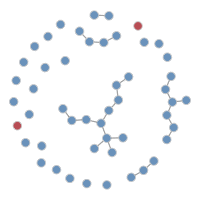EpiModel
Mathematical Modeling of Infectious Disease Dynamics
EpiModel is an R package that provides tools for simulating and analyzing mathematical models of infectious disease dynamics. Supported epidemic model classes include deterministic compartmental models, stochastic individual contact models, and stochastic network models. Disease types include SI, SIR, and SIS epidemics with and without demography, with utilities available for expansion to construct and simulate epidemic models of arbitrary complexity. The network model class is based on the statistical framework of temporal Exponential-family Random Graph Models (ERGMs) implementated in the Statnet suite of software for R.
Current version of EpiModel available on CRAN is 

